How Had I Never Seen... "Last Year at Marienbad"?
 Friday, September 10, 2021 at 6:00PM
Friday, September 10, 2021 at 6:00PM by Nick Taylor
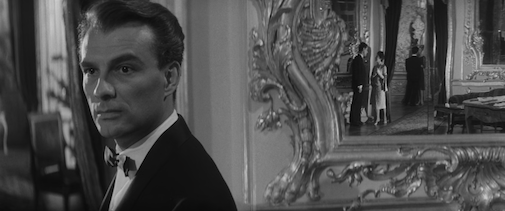
Where to even begin with Last Year at Marienbad? In one sense, Alan Resnais’s film announces itself as a slippery, enigmatic object from its very first image. The resplendent music, equally ominous and inviting, mixes with the opening narration like they’re from the same source. Sacha Vernig’s silvery, elegant photography, gliding through the grounds of a baroque, ornate hotel and over dozens of handsome, impossibly rich guests, immediately communicates that Resnais has built a film both ephemeral and obsidian. The editing typically feeds into this gilded fluidity, save for when it disrupts those established rhythms as some other memory and breaks through an ongoing sequence like an intrusive thought to assert its own impression. The hotel itself looks glamorously assembled, yet every tree and painting have the same energy as the obelisk from 2001. The whole place feels inevitable without being easy to read.
And yet, Last Year at Marienbad isn’t obtuse about its mysteries...
For all the repeated conversations, unexplained asides, and unsettling, even inexplicable implications that accrue around the man and woman who comprise the film’s central bond, they aren’t presented in a way that flaunts their unknowability or teases a “right” answer it’s also withholding. There’s no Memento-style build to the one scene that will lay everything out and explain it. Instead, the fluid momentum washes all of these conflicting realities onto the audience, and lets us decide for ourselves which (if any) of the realities we’re seeing are what these characters are really experiencing. We’re given room to really think about the images we’re seeing and the testimonies being given, allowing us to interpret them how we see fit.
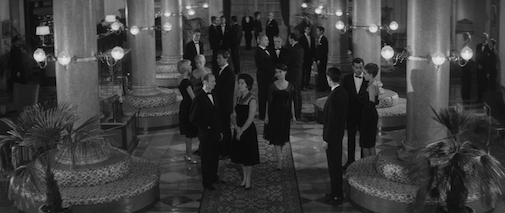
Last Year at Marienbad follows an unnamed man (Giorgio Albertazzi, who sometimes passes as a dead ringer for Chris Nolan) and an unnamed woman (Delphine Seyrig, distinguishable in any crowd, and achieving international stardom in her third-ever performance) who’s on vacation with a man who might be her husband (Sacha Pitoëff). They’ve taken up lodging at an unspecified hotel in an unknown country. The man tells her that they had met on vacation the year previously at Frederiksbad, where they had a passionate affair. When their earlier time together ended, he asked her to run away with him, and she promised to consider his offer for a year before giving him an answer. She balks, and claims with utmost certainty that she’s never met him before.
The man will spend the rest of the film trying to remind her of their history, recounting past interactions in fastidious, prosaic detail. Sometimes the images we see from these flashbacks don’t match his narration, and the man will backpedal to remember a new detail or trash the whole story as an accidental fabrication. Sometimes the woman contradicts his narrations, either by dismissing them out of hand or offering corrections of her own. When one of his stories pierces her locked-up memories, she looks like she’s unlocked some awful, tucked-away secret hidden deep in her mind.
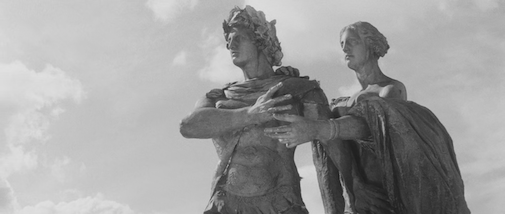
Fair enough, when the stories he’s telling slip further and further into a version of events she may or may not have experienced herself. Maybe she died a year ago, either by his hand or her husband’s. Maybe the man died. Maybe the hotel itself is purgatory, and for all the man’s talk of rendezvouses at other locales, no one has ever left it. Is this place even Marienbad? Or maybe, worst of all, she really did have this swooning, risky affair, and is so conditioned to whatever life she’s had that she really did bury it. Maybe this man is telling the truth as best he can remember it, and she can barely save herself in time to finally make a decision.
Seyrig implies all of this throughout Last Year at Marienbad. Much like Anna Magnani’s tonally and generically dissimilar turn in Rome, Open City, Seyrig acquits herself to the high stylization of her auteur while using her body language and remarkable face to illustrate multiple ideas about her character at once. She knows how to use her beauty to maintain Resnais’s otherworldly glamour, yet she defies the statuesque beauty of the other guests, shifting her gait and evocatively posing for the camera. Arousal, boredom, anxiety, glee, pensive introspection, and numb recognition all flicker across her face and body, without ever seeming prescriptive of how the man has imagined her. Sometimes she turns those magnificent eyes towards the beyond and looks lost in her own world, perhaps dreaming of a rendezvous with this handsome stranger unlike the ones he’s already shared. It’s a strange performance, more a mood piece than a strict characterization, yet she opens up the film’s perspective and emotional palette considerably.
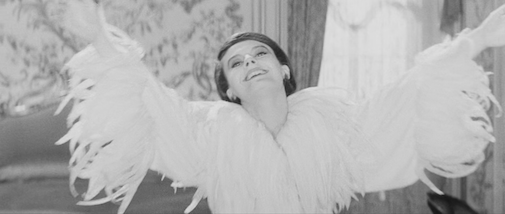
To argue Seyrig’s performance constitutes the most accessible element of Last Year at Marienbad is to make a certain claim about how to interact with such a tricky object. At the very least, she’s the most emotionally direct figure on screen, unlike the brooding narrator who’s trying to convince her to run off with him. She’s certainly more engaging than the endlessly proficient second man, who’s kept at a distance from Resnais’s most florid passages but always asserts his prowess whenever the film returns to him. But the film’s rigorous visual and aural ideas remain accessible on its own avant-garde terms, inviting audience engagement while leaving room to draw our own conclusions. If you think they’re in purgatory, great. If you think he’s right, go nuts. If you think she’s right and he’s incepting her into leaving her husband, that can be it too!
This potential makes Last Year at Marienbad a sublime, exciting experience rather than vague or frustrating one, though I suppose that’s as fair an interpretation as anything else. Perhaps you think these characters are vague rather than opaque, or that the cinematography is a lacquer over a thin plot rather than an inventive, gorgeous means to dramatizing Resnais’s heady, complicated ideas. I wouldn't agree, but I see where it's coming from. In a film that lets you see this many sides of itself, one might decide it all adds up to nothing. But for me, its ingenuity is readily apparent. I can't wait to keep pouring over this film and seeing what stands out next time. Maybe it'll be another year, maybe not, but I won't stop thinking about it, whatever it is.
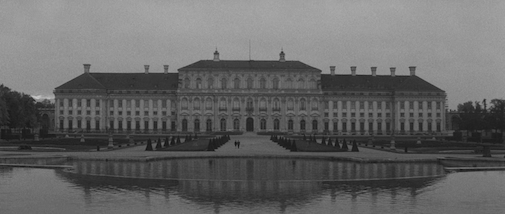
previous editions of "How Had I Never Seen?" in which our Team fills in their personal movie-gaps



Reader Comments (3)
I purchased the Criterion DVD for this film I think a decade ago and still have it. Man, it's such a beautiful film as I love the sense of ambiguity and the visual language of it. A true masterpiece.
Mysterious woman and enigmatic man meet at a palatial (non)place where mostly non-mobile people interact like statues, but dressed in classic b&w designer clothes. Conversations flow regardless of time and space, preferring poetic words of love and betrayal to convey what they mean. But did this strange encounter even happen? Is this all a dream? Or just a narration told out of order as to throw any linearity out the window.
Like you, I quite enjoyed the ambiguity because I can project my own version of the story based on feelings evoked by the ambiguous words spoken as dialogue and voice-over. The English translation is sparse and not as eloquent as the spoken French but maybe that is for the best: it is like joining people mid-conversation where you somehow absorb the emotional vibration even if the words don't quite cohere or make sense. And that organ music score is both beautiful and haunting, and yet it also reminded me of childhood nightmares. Unforgettable film.
I love this film and its mysteries. Nice take on it.